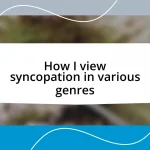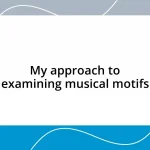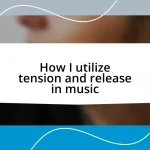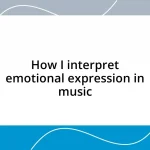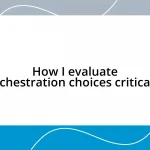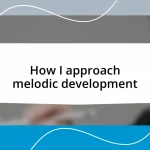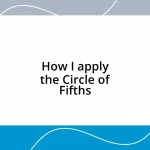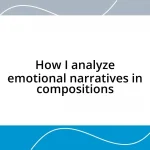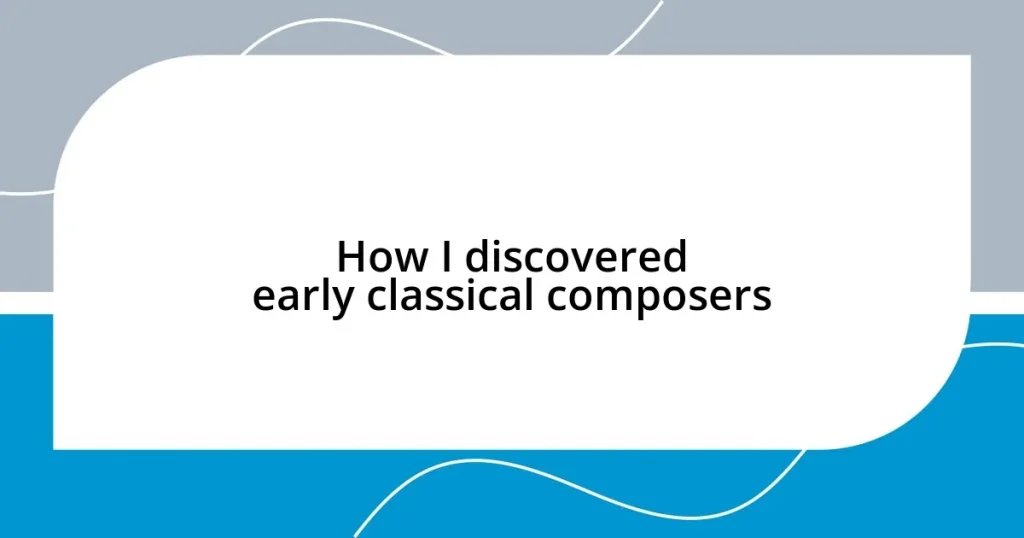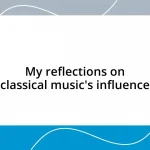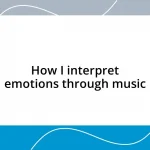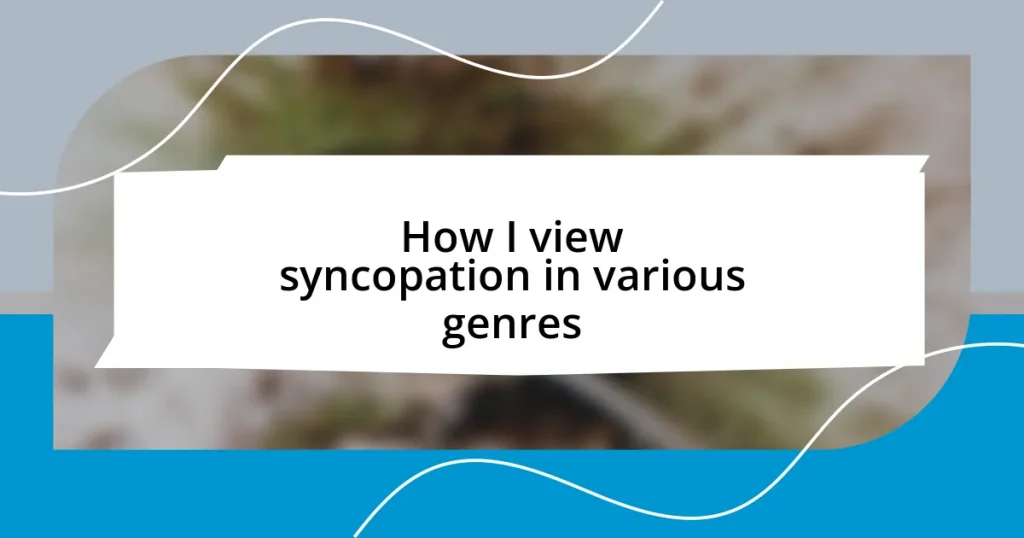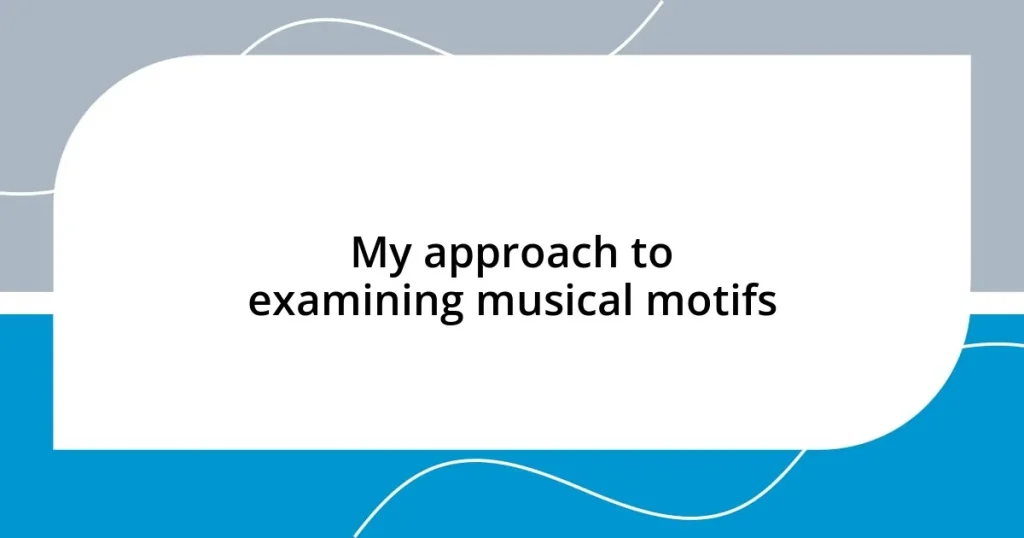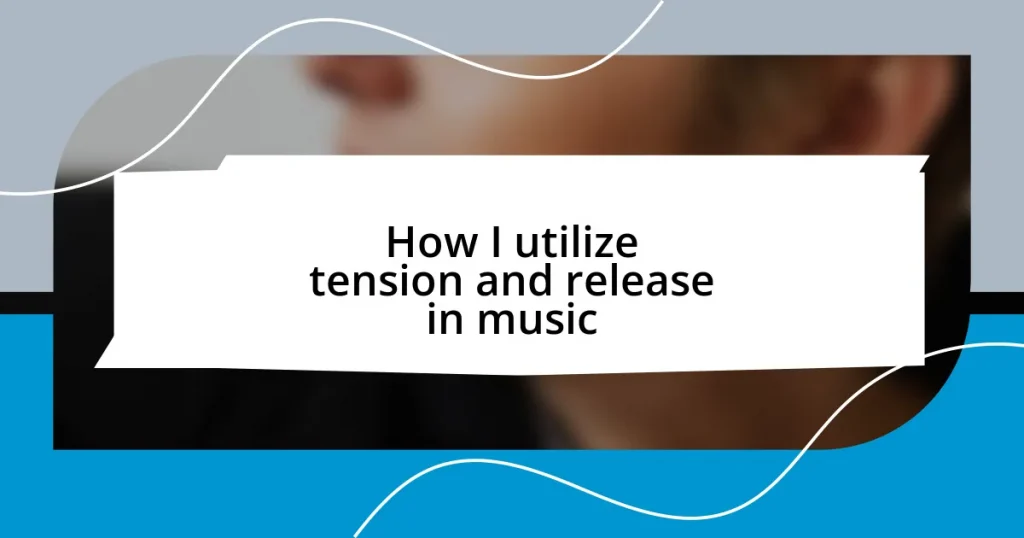Key takeaways:
- Discovery of classical music sparked by an old vinyl record of Mozart, leading to a deep emotional connection with music.
- Engagement in high school orchestra fostered camaraderie and appreciation for classical compositions, notably by Bach and Vivaldi.
- Understanding historical context of composers enriched appreciation of their works, adding depth to the music’s emotional impact.
- Attending live performances created memorable experiences, highlighting the communal power of music in uniting people.
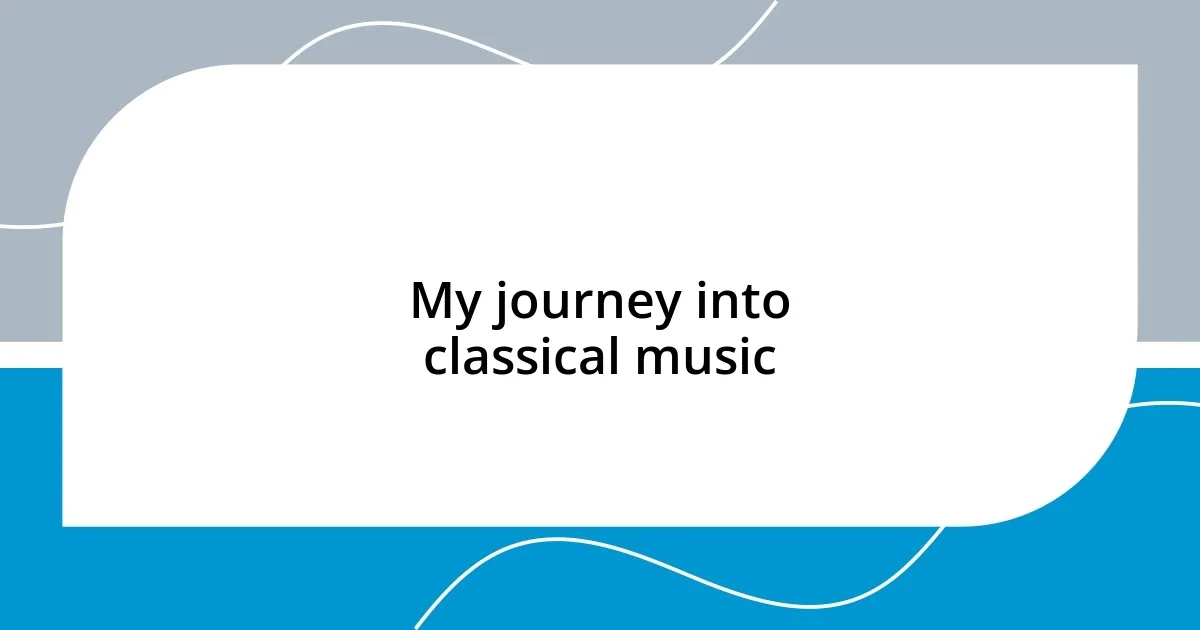
My journey into classical music
My journey into classical music really began during a rainy afternoon when I stumbled upon an old vinyl record in my grandmother’s attic. As I placed the needle on the spinning disc, the sounds of Mozart’s symphonies flooded the room, and I was captivated by the intricate melodies. Have you ever had a moment where music seems to transport you to another world? That was my defining moment.
During high school, I joined the orchestra, and it was there that I discovered the thrill of playing pieces by Bach and Vivaldi. I remember the exhilaration of nailing a challenging passage in rehearsal and the sense of camaraderie that developed between my fellow musicians. That was when I realized it wasn’t just about playing music; it was about feeling connected to the rich history and emotion behind each note.
Years later, while exploring the depths of Beethoven’s late quartets, I was struck by a profound sense of vulnerability and resilience in the music. Listening to those compositions felt like reading a diary, full of struggles and triumphs. Isn’t it fascinating how a single piece of music can evoke such deep emotions? For me, it reinforced that classical music isn’t just about the notes; it’s a powerful expression of the human experience.
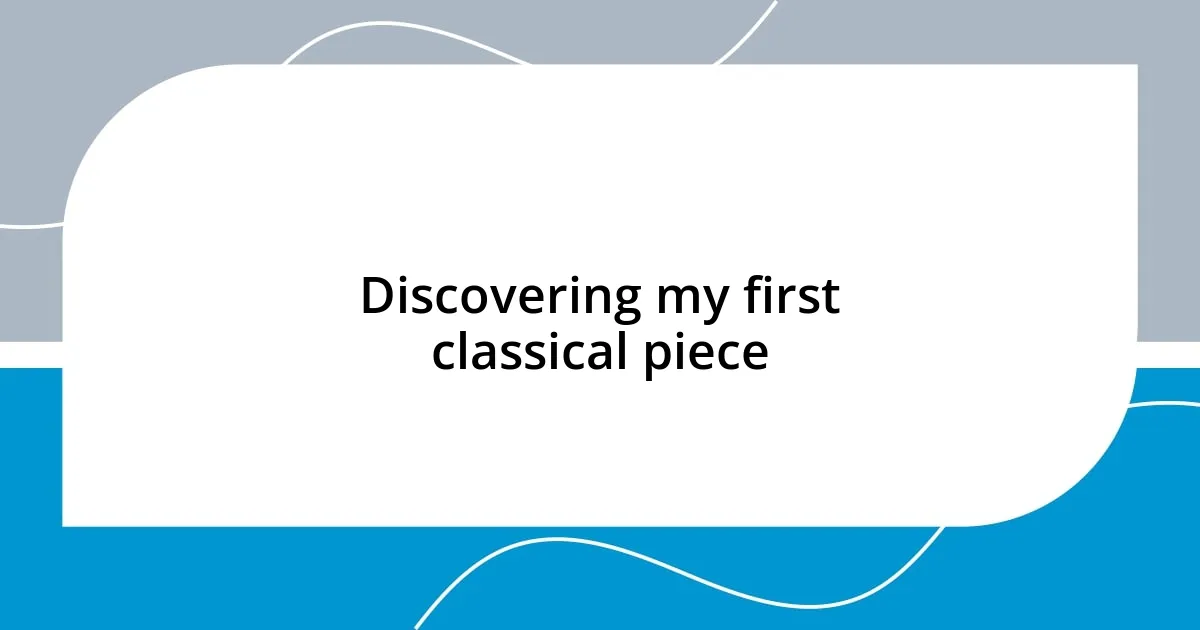
Discovering my first classical piece
It was a simple piano piece that changed everything for me. One day, while browsing through my local music shop, I discovered Beethoven’s “Für Elise.” As I tried to play those flowing notes on the piano, I was struck by how they resembled a conversation—each phrase seemed to answer the last. I’ll never forget the way I felt; it was as if I was unlocking a hidden treasure, revealing the beauty of classical music for the first time.
Later, as I experimented with other compositions, I stumbled upon Chopin’s Nocturnes. The emotional depth in those pieces resonated with my own feelings, especially during tough teenage years. I remember sitting in my dimly lit room, letting the melodies wash over me like a warm embrace. It was in those moments that I felt truly understood; the music spoke what I couldn’t put into words.
My encounter with classical music didn’t just stop there; it transformed my perspective on life. Each composition I explored opened a new door of understanding and appreciation. Have you ever experienced that rush, where everything just clicks? For me, that realization was profound—classical music was a universal language that bridged generations and cultures.
| Composer | Piece |
|---|---|
| Beethoven | Für Elise |
| Chopin | Nocturnes |
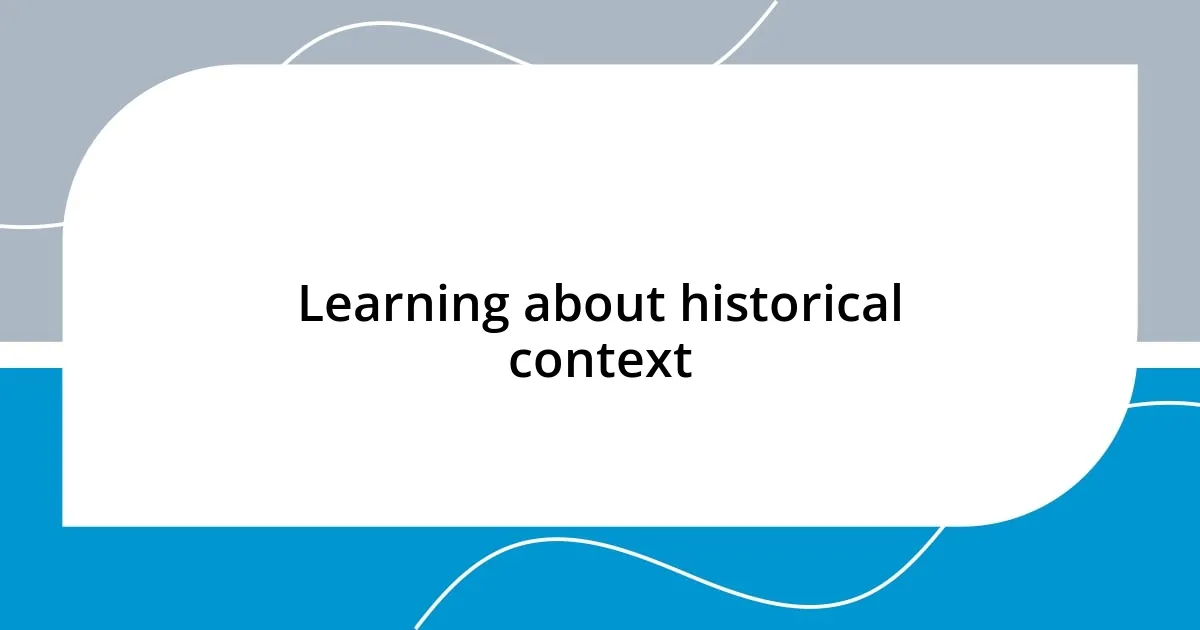
Learning about historical context
Learning about the historical context of classical composers truly enriched my understanding of their music. When I first encountered the compositions of Bach, I was amazed to discover that he created his masterpieces during the Baroque period, a time characterized by ornate artistry and elaborate ornamentation. I’ll never forget the moment I learned about the tumultuous political landscape influencing his work; it made the emotionally charged notes seem even more profound, almost like a response to the world around him.
Understanding historical context adds layers to the music, enabling listeners to appreciate the intent behind each composition. Here are a few key factors that shaped the early classical composers:
- Cultural Influences: The rise and fall of empires greatly impacted the artists, often shaping their creative directions.
- Religious Themes: The prominence of religion in daily life during earlier eras influenced many pieces, seen vividly in Bach’s sacred works.
- Personal Struggles: Composers like Beethoven faced significant personal challenges, including deafness, which created a dialogue between their struggles and their art.
Exploring these aspects allowed me to connect more deeply with the pieces, as if I was conversing with the composers who poured their lives into their music.
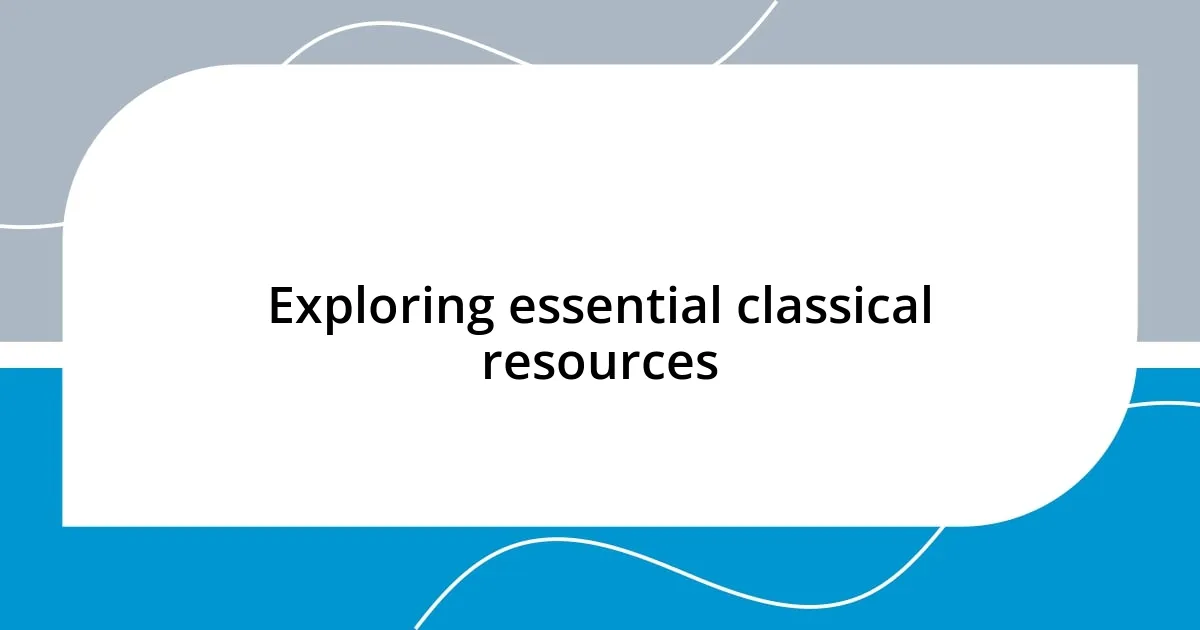
Exploring essential classical resources
When I started diving into classical music, I discovered a wealth of resources that truly deepened my appreciation. For starters, I found that online platforms like Spotify and YouTube not only provide a vast collection of works but also feature playlists curated by music lovers and experts alike. I remember one time, while scrolling through a playlist titled “Essential Early Composers,” I stumbled upon Vivaldi’s “The Four Seasons.” The vivid imagery those notes created was incredible—it felt as if I could see the changing seasons through music.
Books also became indispensable companions on my journey. One of my favorites was “The Lives of the Great Composers” by Harold C. Schonberg. As I flipped through the pages, each chapter introduced me to the intricacies of a composer’s life, entwining stories of their struggles and triumphs with their artistry. This read truly struck a chord with me; learning about the challenges faced by someone like Haydn made his joyful symphonies all the more poignant. Have you ever felt that a book brought music to life in a way that listening couldn’t? It certainly did for me, revealing the human spirit behind each note.
Visiting local orchestras also became a transformative experience. I attended a family concert that featured various composers, and the energy in the hall was palpable. Witnessing musicians pour their hearts into the performance supercharged my passion for classical music. At that moment, surrounded by the rich textures and harmonies, I realized that classical music is more than just notes on a page—it’s an experience best enjoyed live, where the audience and performers share a unique, fleeting connection.
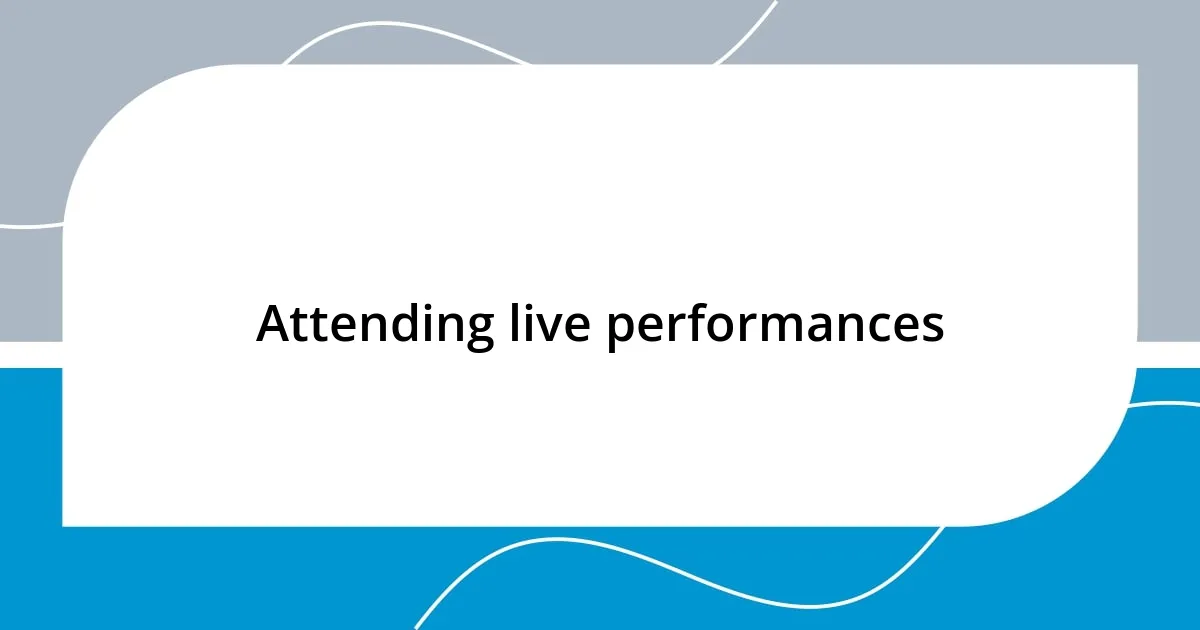
Attending live performances
Attending live performances was like unlocking a secret world for me. I vividly remember my first symphony experience when I heard Mozart’s “Symphony No. 40” played by a local orchestra. The moment the violins soared, I felt an electric charge in the air, like a shared heartbeat between the musicians and the audience. Have you ever been in a crowd when the music swells and you can almost feel the emotions ripple through everyone present? That experience cemented my love for classical music in a way mere recordings never could.
One evening, I decided to catch a chamber music concert at a small venue. As I sat in the warm glow of the stage lights, the intimate setting allowed me to observe the musicians closely. Each subtle glance and nod between them transformed the performance into a conversation, a dance of creativity. I realized that the nuances in their expressions could express more than words ever could. It was in those moments that I felt a profound connection to the music, as if I were part of an ancient tradition where every note carried the weight of history, emotion, and talent.
A few months later, I attended an outdoor classical concert under the stars. The backdrop of a twilight sky, accompanied by the lush sound of Tchaikovsky’s “Swan Lake,” was nothing short of magical. At that moment, surrounded by laughter and the occasional rustle of the audience, I reflected on how music has an incredible power to unite people. It’s fascinating, isn’t it? How a simple gathering, with melodies woven through the night air, can create lasting memories and deepen our appreciation for these early composers.
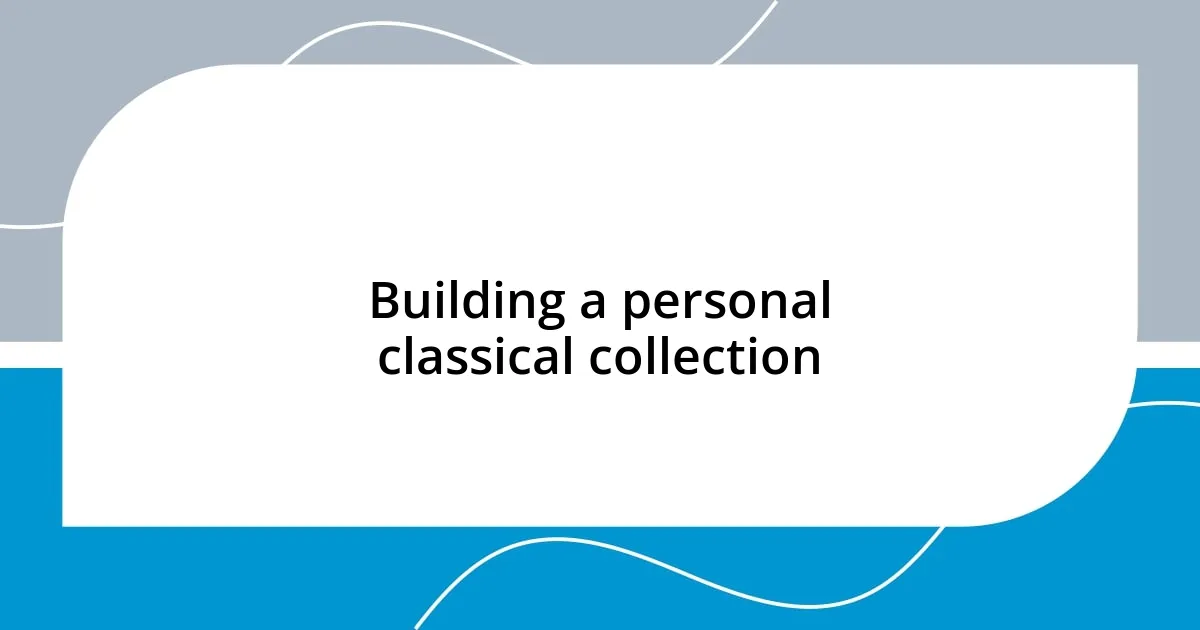
Building a personal classical collection
Building a personal classical collection is a journey that unfolds with discovery and passion. I started by gathering vinyl records and CDs from various genres, but there’s something special about having physical copies of music that resonate with me. I remember coming across a dusty Beethoven symphony record at a local thrift store. The moment I pressed play, it felt like I was opening a door to a timeless world, full of drama and beauty. Have you ever found a treasure like that, where the music becomes an experience etched in memory?
As I continued to build my collection, I realized the importance of diversity. It’s not just about the popular composers; exploring lesser-known figures like Maria Anna Mozart or François Couperin added layers to my musical understanding. I once purchased a box set dedicated to Baroque composers, and each disc felt like an invitation to a new realm of creativity. Listening to them side by side, I could see how different styles emerged in response to their times. Isn’t it enlightening how a single era can yield both well-known masterpieces and hidden gems?
Finally, don’t underestimate the power of personalized playlists. I started curating my own on digital platforms, blending my favorite composers with pieces that evoked specific emotions or memories. One playlist features pieces that have been my soundtrack during significant moments in life. Every time I play it, I’m taken back to those experiences. It’s incredible how music can hold our stories. Can you relate to that feeling? The music we collect is not just an assortment of sounds; it’s a reflection of who we are and the moments that shape us.

